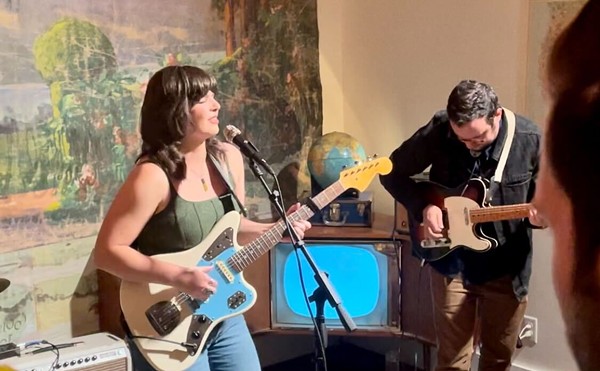RFT: It's an interesting continuum -- you write the songs together, and then you record them together and pretty much self-produce.
Rennie Sparks: We're going to build a bio-sphere and live in it!
Brett Sparks: We do all the art for the CDs; we put up our own Web site. I think it's better to do it yourself. If you let someone else do it, they're going to fuck you. They'll take 80 percent of your money.
It seems like you guys have a pretty big fanbase in Europe. Do you think your European audience is different from your American one?
Brett: I think people just have a different cultural sensibility. We always get this stuff over here, "Oh, you're so morbid, you're so dark!" In England they just think it's dark humor, whatever. In Ireland, they just think it's about everyday life. It's just like folk tales or something. In Ireland, we'll play a show, and people will come up to the stage and start quoting you alternate versions of "The House Carpenter" and quoting poetry and stuff. These are guys who just look like normal Joes, you know? It's amazing, the cultural literacy that they have.
Do you think non-English-speaking audiences have a different relationship with your music?
Rennie: We get people from Holland writing these essays on our lyrics. I mean, if you're going to go to the effort of reading lyrics in another language, you get pretty intense about it, whereas Americans can hear them or not hear them while they're doing their dishes or something. I think maybe it's that some cultures are more into deep thinking than others.
Brett: The Germans especially. They'll come up to you after a show and say (adopts gruff Schwarzenegger accent): "I want to discuss this lyric with you!" They'll argue with you about anything -- things like "I do not like your new record! Your last record was much better. Go back in that direction."
All the articles about you start out by mentioning that you're a husband-and-wife band. Do you think it's relevant at all to your music?
Rennie: I think it makes it easier for us to work together. We can argue about songwriting, but it doesn't get really hurtful. We can take a break and be friends again. You can't walk out without a lot of packing and lawyers.
Brett: Yeah, there's at least one adversarial relationship going on in the average four-piece combo: the principal songwriter and somebody who's trying to become the principal songwriter.
How do you work as a songwriting team?
Rennie: I work on the lyrics first, and after they're done I give them to him, and I tell him how they should go musically, and he ignores me.
Brett: Pretty much. If I left it up to her, they'd all sound like "The Night Before Christmas." She was going through this period where everything had that 6/8 cadence.
Why is death such a persistent theme?
Rennie: Goddamn it, I don't know! It's not my fault; it's everywhere. It makes sense to me that if you're going to write about life, it's going to have death in it. To me, thinking about death makes life richer. I don't think it's a destructive thing, necessarily. I do think that's why some people are leery of us. They say, "Oh, your songs are so depressing! I'm afraid!" -- like they're afraid they're going to get stuck in a bad mood if they listen to them!
Brett (Mock terror): "I'm not going there! Give me the Lenny Kravitz album!"
Rennie: I guess I'm just kind of obsessed with opposites in a way -- little cuddly animals and big ferocious animals. Snow is beautiful and white and clean, but it's freezing, and it's horrible to be in. Everything is one thing and another thing. And the next thing you know, you're sitting on the couch with a pen, going "I want to write something!"
Brett: Then my troubles begin!
What do you think of her lyrics, Brett?
Brett: I think I sometimes kind of pull Rennie in about certain things. I'll say, "This is a little too much, too depressing." That's one good thing about our relationship: She's the depressive and I'm the manic. I've never been seriously, clinically depressed a day in my life, and Rennie has.
Rennie: Yeah, like usually for every song that's about a murder or death in it, there'll be another stanza where they chop the body up and roll around in the blood, and he'll say, "No, that last paragraph was too much!" But it's not the murder. I don't like murder. I don't want to murder anyone. When I read in the newspaper about somebody being murdered, I don't go, "All right! Another death!" It's different to talk about murder as a metaphor or as a symbol or something in art. In life, it's different. People will ask me why I like these murder ballads -- "Why, do you want to kill people?" There's a release in it. Some real cathartic thing.
Brett: Like opera!
What do you guys get into besides music?
Rennie: I watch all these nature shows where zebras are getting torn apart by hyenas, and I'm fascinated by that stuff. The brutality of nature is so far beyond. We're talking about murder ballads, but the reality of the natural world is just so much more.... The thing about hyenas is, they have to do that. What else can they do? That's the way they've been designed by evolution ... And then there was this one lion cub that got bitten by hyenas, and the mother went up to the baby cub and just bit its neck and killed it. You can't have a limping lion in the pack, you can't. And so, there's that, but when I'm really depressed and I look at goofy pictures of baby animals, I get really happy.
Brett: Preferably kittens in bonnets. She really goes for that.
What do you think is your husband's/wife's greatest talent?
(Long pause ending with laughter)
Rennie: He's good at laundry. Oh, musically -- well, what amazes me, because I don't have it, is this really amazing sense of melody and harmony. To find harmonies in melodies is, to me, like pulling rabbits out of my ears or something. He comes up with some really complex, interesting thing. Everything from me would sound like "The Night Before Christmas."
Brett: I think Rennie's greatest strength as a lyricist is that she has a really good eye for detail and the songs are very cinematic, sometimes like little snapshots or something. I think a great thing about her lyrics is that they're emotionally ambiguous, and they leave room for people to figure out what meaning they can glean from them. When you read a good book, everything isn't all spelled out for you. You're constantly revising how you feel about the characters, and the story keeps changing. That obviously comes from her background in writing fiction.
Rennie: I'm really happy at shows when someone will come up to me and say, "I really love that song; it's so funny!" and someone else will say, "That's the saddest song in the world -- I love it!"
It's wonderful that your songs can be both simultaneously so much of the time.
Rennie: I just think life is so beautiful. I would have killed myself a long time ago if I didn't feel that way. But it's also sad, and scary, and unfair -- but at the bottom it's always beautiful. Even watching the little antelope get torn apart by the hyenas: It's horrible, but it's beautiful, too. That's the only reason I'd want to write about anything anyway, it's just to record this beautiful thing, try to capture it. I really love gospel songs, or songs about ideal places or the afterlife, or songs about some ideal, perfect love that's unattainable; the imagining of these things is a victory over the darkness or chaos or randomness of your life. For me, in a way, it makes the songs more bittersweet because I don't believe in this place called heaven. It's just so beautiful to me that these people are imagining this place. This amazing capacity humans have for imagination --
Brett: For self-delusion!
Rennie: Whatever it is, it's an amazing concept to come up with. To me, it's more beautiful because it doesn't exist. If life just sucked, we would never have the notion of heaven; it's because we have these little glimpses of it. To me, the imagining of it is proof that there is something redeeming, even if it's all in our head.





